The best and worst Welsh rugby of the decade
- Published
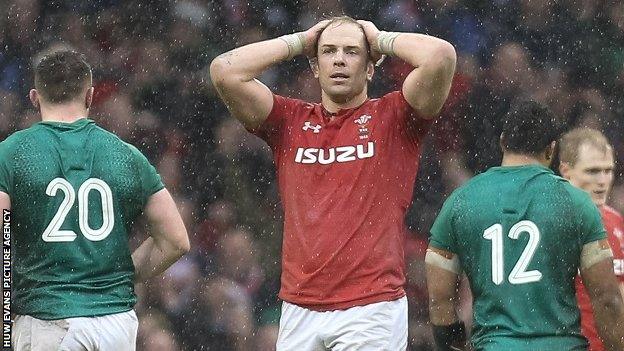
Alun Wyn Jones captained Wales to the 2019 Six Nations title and their third Six Nations title of the decade
BBC Sport Wales takes a look at the best and worst moments of Welsh sport in the past decade.
In our second instalment we focus on rugby at the end of what will inevitably come to be known as the "Gatland era" and will sit alongside the Welsh international game's golden eras of the 1970s and the early 20th century.
But while the international game has largely flourished, domestic rugby in Wales has been a story of political turmoil punctuated with some notable highlights.
You can read our football review of the decade here., but for now let us concentrate on the story of the oval ball game in Wales between 2010 and the end of 2019.
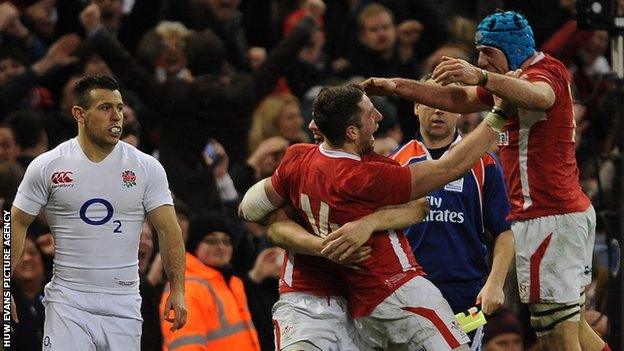
Wales' 30-3 triumph against England in 2013 was a highlight of a memorable decade
Gatland's golden era
Six Nations Grand Slams in 2012 and 2019, a memorable championship victory in 2013, two World Cup semi-finals and a level of consistency not seen since the days of Gareth Edwards and company in the golden era of the 1970s.
It was a decade of memorable moments for Warren Gatland's Wales.
It started with Sam Warburton and Shane Williams and ended with Alun Wyn Jones and Josh Adams … and with Gatland bowing out as coach with a photo call in front of the gates which now bear his name at the Principality Stadium.
So what are the highlights? Most would agree that the victory over England in the 2013 Six Nations championship decider topped the bill.
England came to Cardiff chasing a Grand Slam. Wales needed to win by seven clear points to clinch the title.
BBC Sport advent calendar: Alex Cuthbert extends Wales lead as they win 2013 Six Nations
In the event England were steamrolled 30-3 in front of "70,000 cavorting Wales fans" at a euphoric Millennium Stadium.
Then there was the 28-25 win at Twickenham in the 2015 World Cup when Wales' wounded and battered side struck a blow that eventually led to England's elimination in the pool stages.
And who can forget the 2010 clash with Scotland in Cardiff? Trailing by 10 points with four minutes remaining, Gatland's men rattled off 17 points in five minutes to win 31-24.
It proved at the start of the decade what opponents would say about Gatland's team throughout the 10 years . . . they just did not know when they were beaten.
Quiz: Name the Wales team that pulled off the great escape against Scotland in 2010?
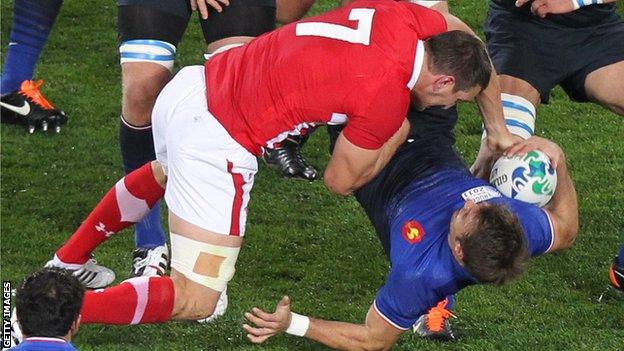
Sam Warburton's fateful tackle on Vincent Clerc came after 19 minutes of the 2011 World Cup semi final
The tip tackle and semi final pain
The red card which ended Warburton's involvement after just 19 minutes of the 2011 Rugby World Cup semi-final following a tip tackle on Vincent Clerc is comfortably the most disappointing, gut-wrenching moment for the national team during the decade.
The 9-8 defeat against a France team many are convinced a full-strength Wales would have beaten comfortably was Gatland's biggest disappointment in his 12 years in charge.
Would youthful Wales have beaten an injury-ravaged New Zealand burdened by expectation and years of under-achievement in the final? We'll never know.
The repeated failure to beat New Zealand at all during the decade when Ireland and England saw-off the All Blacks is another irksome fact . . . but South Africa and Australia (eventually) were beaten.
In a dramatic coincidence it was France who paid the price for a red card in the 2019 Rugby World Cup when Sebastien Vahaamahina was given his marching orders for elbowing Aaron Wainright.
Wales toiled to beat France 20-19 before Gatland's quest to steer Wales to a first World Cup final ended in a 16-19 defeat by South Africa thanks to Handre Pollard's late penalty.
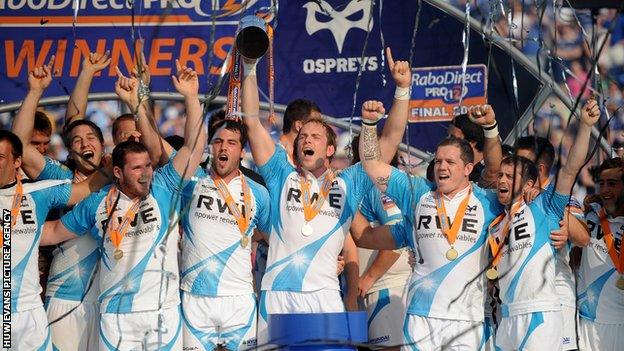
Alun Wyn Jones captained the Ospreys in the 2012 Pro12 final
The Welsh regions' best moments
It might seem odd at a time when the region is struggling with injuries and poor form, but Ospreys started the decade as the power in Welsh domestic rugby.
They won the domestic title - then known as the Celtic League - in 2010 and repeated the feat in 2012 when it had morphed into the Pro12.
On both occasions they beat Leinster in Dublin in the final - the second victory clinched in the dying minutes thanks to a try by Shane Williams, in his final game for the region, converted from the touchline by Dan Biggar.
Quiz: Can you name the Ospreys team that won the 2012 Pro12 final?
Scarlets also beat Irish opposition in Dublin when they won the title in 2017, this time against Munster.
But Wayne Pivac's team needed no last-minute heroics as they ran the Munstermen ragged in a 46-22 win at the Aviva Stadium. It was an outstanding display of attacking rugby as impressive as anything produced by a Welsh region during the decade.
Scarlets also reached the semi-final of the European Champions Cup in 2017-18 but were heavily beaten by eventual winners Leinster.
Cardiff Blues were Wales' flag-bearers in the second-tier European challenge Cup - winning the title in 2010 and 2018 with wins over Toulon (28-21) and Gloucester (31-10).
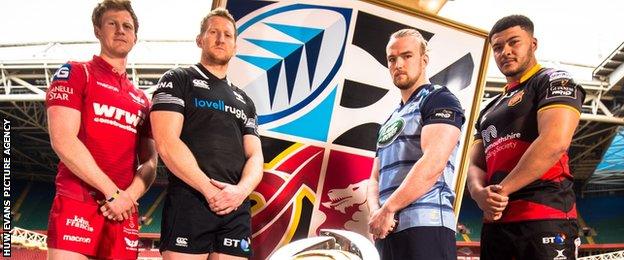
Judgement Day has become an annual event in Welsh domestic rugby since 2013
Disappointments for the regions 'a common theme'
A common theme of disappointing crowds and a continuing struggle to keep big-name players in Wales characterised the decade, with a side-order of protracted arguments, disagreements and eventual resolution to questions of governance and finance.
Regions and the Welsh Rugby Union have negotiated hard about how to compete with better-funded club games in Ireland, England and France and introduced restrictions on selecting players for Wales if they play club rugby in other countries.
The WRU took over the running of Newport Gwent Dragons in 2017 who became just Dragons but the decade ends with the region aiming to regain its independence.
Proposed mergers of Scarlets and Ospreys have been and gone, as has a move to create a region in north Wales - for now.
A decade of wrangling has seen the Participation Agreement become the Rugby Services Agreement; it's seen the introduction of dual central contracts for top players and their planned replacement with pay bands; it's seen the creation of a professional board - with representatives of the union and regions - to run the regional game.
But a continued failure of Welsh domestic teams to compete at Europe's top table - in stark contrast to the national team - suggests the arguments are probably not over.
The current deal ends in 2020 and negotiations about a replacement are already underway . . . now that's something to look forward to in the new decade!
Women's rugby and a decade of change

Jazz Joyce made her 15s debut against Scotland in the 2017 Six Nations
Women's rugby has seen huge strides in coaching, facilities and participation at all levels.
Memorable moments include the 2015 Six Nations opener when Wales stunned England with a 13-0 win at St Helen's. It was only the second time Wales beat England in their history.
Another was the seventh place play-off at the 2017 World Cup which saw Wales beat Ireland 27-17 to earn a place at the 2021 tournament in New Zealand.
There has also been the emergence of genuine stars like flying winger Jazz Joyce, who set the sevens stage alight at the 2016 Rio Olympics.
But with the highs come the lows and none more so than the death of Elli Norkett who died in a car crash in 2017. She was the youngest player to feature in the 2014 World Cup.
And while players in Wales are a long way from joining their English counterparts in becoming professional, the promotion and media coverage of the women's game has never been better.
This was no more evident than last month when Wales launched its first women's invitational Crawshays team and the Barbarians double header where the women took centre stage at the Principality Stadium, playing in front of 12,600 fans there before the men's game.
There have been strides off the field as well with Amanda Blanc appointed chair of the Welsh Rugby Union's Professional Rugby Board in December 2019.
In October former Wales international Liza Burgess became the first woman to be elected to the WRU Board, whilst Aileen Richards has been a non-executive director since 2015.